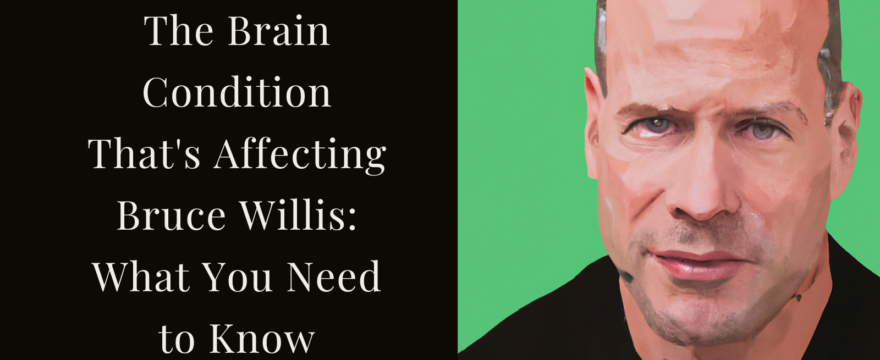You may have heard that the actor Bruce Willis is suffering from a form of dementia called frontotemporal dementia, or FTD for short. He is only 67-years-old. It’s really sad because typically when people reach that age, they are looking to settle down and really enjoy life after giving so much to their careers and money making activities. This is why my life motto is to really Carpe Diem. There is no time like the present because that is the only time that exists.
Bruce’s family made a statement that they are relieved to finally have a clear diagnosis but that there are currently no treatments for this disease and they hope that media attention can be focused on raising awareness and researching potential solutions.
Below I outline the importance of brain health awareness, focusing specifically on the temporal lobes and the prefrontal cortex. These two areas are crucial to our ability to remember events, process language, and make sense of sensory input.
The temporal lobes are located on either side of the brain and are responsible for long-term memory storage. These structures play a vital role in helping us remember events, facts, and people from our past, as well as recognizing objects and processing language. Damage to the temporal lobes can lead to memory loss, language impairment, and difficulty recognizing familiar people or objects.
The prefrontal cortex—which is found at the front of our brains—is the key player in helping us stay on track. It’s responsible for executive functions like decision-making, planning, and impulse control. You might know it best as that voice in your head that helps you make smart choices. In Bruce Willis’ case, this part of his brain was damaged, leaving him with impaired executive function.
When it comes to diagnosing different types of dementia, a SPECT (Single Photon Emission Computed Tomography) scan can be a useful tool. This imaging technique helps identify changes in blood flow in the brain, which can indicate areas of decreased activity or injury. By detecting changes in blood flow in specific areas of the brain, healthcare providers can diagnose different types of dementia and develop a tailored treatment plan, which can include lifestyle and dietary changes before pharma drugs are needed.
Sometimes pharma drugs can cause brain issues, which is why lifestyle and diet are typically the best starting points. For example, some patients report that selective serotonin reuptake inhibitors (SSRIs) are helpful, but also cause decreased motivation or memory problems. On a SPECT scan, we may see a pattern of decreased prefrontal or temporal lobe activity when folks are taking SSRIs.
Want to give your executive function and prefrontal cortex a boost? Try setting goals, getting organized, going for a high-energy workout, upping your protein intake, and adding some supplements like EPA omega 3s from algae, green tea, or rhodiola to your routine.
It’s clear that the prefrontal cortex plays a vital role in our day-to-day lives, and problems in this area can have significant impacts on our abilities to plan, solve problems, and make sound decisions.
I hope that by discussing these topics, some light can be shed on the importance of brain health and how we can work to improve our cognitive function.
Thanks for reading! If you’re interested in learning more about improving your brain health and staying up-to-date on the latest research and strategies, download my checklist on how to diversify your gut microbiome, which is ground zero for the health of your body and brain.
Resources:
💞 Join the Facebook Group for support on your wellness journey
🧘🏿 It’s not just a certification. It’s a movement. Learn more about The Plant Protocol.
📖 My book, You Can Afford to Be Healthy
RawFoodMealPlanner.com © 2023

Well written and interesting
Thankyou
How much protein does a vegan need?
Alwynne
Thank you for reading and commenting. I love this question. We should have a balanced plate making sure we are eating protein at each meal and a sufficient amount to be satisfied and full. If you are overeating, it may mean not enough healthy fat and protein is on your plate. With that said, vegans actually get too much protein right now. Vegans in the U.S. get 70% more protein than they need. This is of course because of all the fake meats out there. Excess protein puts a strain on the kidneys even if they come from plants. But some folks in my family have such a small amount of plant protein served at meals, you can never really get full. You have to find the right balance for you.